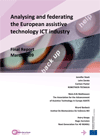 There are currently approximately 45 million people in Europe who report a long standing health problem or disability. Further, the aging population means that more people will have to live with some sort of disability. Recent figures from the 2008-based national population projections EUROPOP2008 show that the share of people aged 65 years or over in the total population is projected to increase from 17.1% to 30.0% and the number is projected to rise from 84.6 million in 2008 to 151.5 million in 2060.
There are currently approximately 45 million people in Europe who report a long standing health problem or disability. Further, the aging population means that more people will have to live with some sort of disability. Recent figures from the 2008-based national population projections EUROPOP2008 show that the share of people aged 65 years or over in the total population is projected to increase from 17.1% to 30.0% and the number is projected to rise from 84.6 million in 2008 to 151.5 million in 2060. Many assistive technology devices are allocated to the elderly and the needs will not be smaller with an aging population. For example, in Sweden, around 70% of assistive devices prescribed go to people aged over 65. These demographic shifts are going to be an important driver behind increases in demand, as well as increases, or changes in the types of demands for more accessible products, including some forms of assistive technology.
This report represents the final report of the study, Analysis of the Assistive Technologies Information and Communication Technologies (AT ICT) industry in Europe for the European Commission. The global objective of the study has been to gain information as to the state of the EU AT ICT industry and develop conclusions and recommendations to what steps can be taken to improve the competitiveness of the companies which form this industry.
Download Analysing and Federating the European Assistive Technology ICT Industry Final Report (.pdf, 2.672 KB).
Download from the eHealthNews.EU Portal's mirror: Analysing and Federating the European Assistive Technology ICT Industry Final Report (.pdf, 2.672 KB).
For further information, please visit:
http://ec.europa.eu/information_society/activities/einclusion/index_en.htm